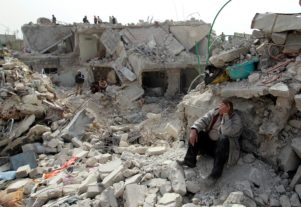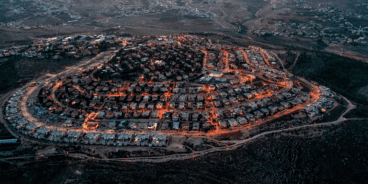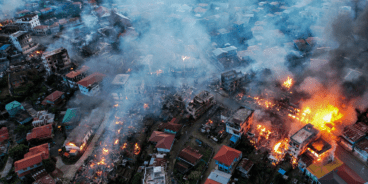
Atrocity Alert No. 146: Syria, Human Rights Council and Cameroon
Atrocity Alert is a weekly publication by the Global Centre for the Responsibility to Protect highlighting and updating situations where populations are at risk of, or are enduring, mass atrocity crimes.
Syria anniversary: Despite 8 years and 500,000 dead, atrocities continue
This Friday, 15 March, will mark eight years since the conflict in Syria began. Since 2011 over half a million people have been killed, 11.9 million have been displaced from their homes and 13 million people remain in dire need of humanitarian assistance.
Despite the prevailing media narrative that the civil war in Syria is coming to an end, populations continue to face the threat of atrocity crimes. During the past year there was a brutal government offensive on the enclave of eastern Ghouta during which 1,700 civilians were killed and 95,000 displaced. Chemical weapons attacks also continued during 2018, including a 7 April chlorine attack on Douma city that killed approximately 70 people. And despite the establishment by Turkey and Russia of a “demilitarized zone” within Idlib Governorate in order to prevent a government offensive against the last major opposition stronghold within Syria, hostilities escalated across Idlib during 2018, leading to scores
of civilian deaths.
Despite the ongoing suffering of ordinary Syrians the UN Security Council remains utterly incapable of taking meaningful action to halt these atrocities. In April 2018 Russia vetoed a draft resolution that would have established an independent investigation into the Douma chemical weapons attack, bringing the total number of vetoes cast by Russia and China since 2011 to twelve and six, respectively. Even when the Security Council has reached diplomatic consensus on Syria they have been entirely ineffective in enforcing their decisions. For example, the destruction of eastern Ghouta directly contravened Resolution 2401 and the Council’s demand for a 30-day cessation of hostilities.
States and regional organizations should not normalize diplomatic relations with the Syrian government until there is accountability for war crimes and crimes against humanity. Donors should also continue to withhold aid and reconstruction funds until conditions for the safe, dignified and voluntary return of refugees have been met. Such conditions must include protection against arbitrary detention and disappearance, as well as legal protections regarding the property rights of returnees. Assistance in rebuilding Syria’s devastated cities and towns should only take place in the context of a wider negotiated agreement on the country’s political future.
Human Rights Council discusses DPRK, Myanmar, Syria and South Sudan
On 25 February the UN Human Rights Council (HRC) opened its 40th session in Geneva, Switzerland. The HRC and its mechanisms play an essential role in providing early warning of situations where violations and abuses of human rights may result in mass atrocity crimes, highlighting the need for effective preventive action. When prevention fails, the HRC can also mandate the investigation and collection of vital evidence regarding potential atrocity crimes, enabling accountability. Currently, 20 of the 47 members of the HRC are also members of the Group of Friends of R2P in Geneva.
On Monday, 11 March, the HRC held an interactive dialogue with the Special Rapporteur on the situation of human rights in Democratic People’s Republic of Korea (DPRK), where crimes against humanity continue to be committed by state authorities against North Korean civilians. In his latest report, Special Rapporteur Tomás Ojea Quintana warned about ongoing violations, including the widespread and systematic use of torture in detention facilities.
Also on 11 March the Special Rapporteur on the human rights situation in Myanmar, Yanghee Lee, presented her latest report, in which she raised concerns about the pervasive use of hate speech by senior government officials, including against the minority Rohingya population. Special Rapporteur Lee called upon the international community to immediately refer the situation in Myanmar to the International Criminal Court.
On 12 March the HRC discussed the recent findings of the Independent International Commission of Inquiry on Syria, including ongoing war crimes and crimes against humanity that were committed during its last reporting period (July 2018 to January 2019). The same day, member states also participated in an interactive dialogue with the Commission on Human Rights in South Sudan, which concluded in its latest report that despite the Revitalized Peace Agreement signed last September, possible war crimes and crimes against humanity – especially with regard to sexual and gender-based violence – continue.
During this 40th session of the HRC the Global Centre for the Responsibility to Protect and other human rights organizations are urging Council members to support the renewal of the mandates of the investigative mechanisms for Syria and South Sudan, and the extension of the mandates of the Special Rapporteurs on DPRK and Myanmar.
UN High Commissioner warns of hate speech and violence in Cameroon
Insecurity in the north-west and south-west regions of Cameroon remains high, with continuing conflict between the government and armed Anglophone separatists. In her opening address to the 40th session of the Human Rights Council on 6 March, the UN High Commissioner for Human Rights, Michelle Bachelet, expressed concern about the alarming levels of hate speech in the country and called upon the government “to take steps to de-escalate the increasing crisis and prevent further descent into violence.”
During February the UN Committee on Economic, Social and Cultural rights reported that the security forces in Cameroon have committed atrocities in the Anglophone region. While the Cameroon government has the sovereign authority to suppress armed groups within its borders, there have been widespread and consistent reports of extrajudicial killings of civilians, mass detention of Anglophone youths, and the burning of Anglophone villages. Armed separatist groups are also reportedly committing abuses against civilians perceived to be government loyalists and have been accused of attacking medical facilities believed to be treating injured government troops.
Political tensions over cultural rights and identity intensified in north-west and south-west Cameroon during 2016 when English-speaking lawyers, students and teachers began protesting against their marginalization by the Francophone-dominated government. According to International Crisis Group, since then at least 500 civilians and 200 members of the security forces have been killed. At least 437,000 civilians have also been displaced by armed conflict in the Anglophone region.
All parties in Cameroon must refrain from hate speech and avoid any further escalation of the conflict. The African Union and UN Security Council must engage with President Paul Biya and ensure the government upholds its responsibility to protect all populations in Cameroon, regardless of language, cultural identity or political affiliation.
Read Next

Media Briefing by the UN Special Adviser on the Prevention of Genocide on the situation in South Sudan
Resolution 33/19 (Human Rights and Transitional Justice) A/HRC/RES/33/19
Resolution 2262 (Central African Republic) S/RES/2262
Resolution 2363 (Sudan and South Sudan) S/RES/2363
Code of Conduct regarding Security Council action against genocide, crimes against humanity or war crimes
Resolution 2449 (Syria) S/RES/2449
Related Content

Atrocity Alert No. 404: Israel and the Occupied Palestinian Territory, El Salvador and North Korea

